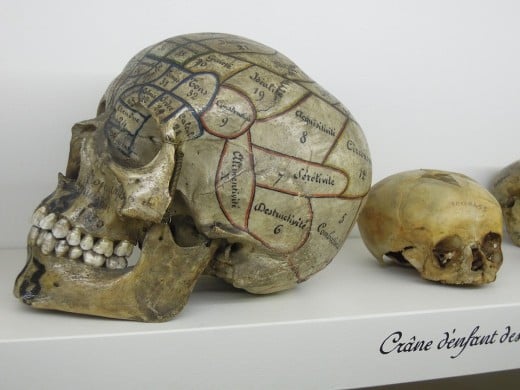How to Develop a Job Personality

Artificial Personality Types: Ineffective Labels
Particular "personality types" are a rather arbitrary categorizing of sets of behaviors in individuals. These types have proved too limiting and serve as an easy way to pigeonhole people with labels that do not always fit.
In administering APA-approved personality tests to thousands of individuals, I find them to be, at best, 50 - 70% accurate.

Several "types" systems include Myers-Briggs; The Four Temperaments, Zodiac Signs; Moon Signs; somatotypes (like thin, fat, or muscular); Type A/Type B/Type C; Block's Types; Ayurvedic Types; Ancient Greek types; types stemming from Phrenology (the study of the bumps on the head); types based on skull structures other than the bumps; the sanguine-phlegmatic-melancholic-choleric continuum; Star Trek characters; Star Wars characters; Marvel Superheroes, Wizard of Oz characters; and a lot of others.
Any of the type systems may provide a starting point for discussion, but an individual must get to know oneself in order to be matched with an appropriate career.
People also mature over time and so does personality. It develops across the lifespan.




Purportedly, different types of personalities are suited to particular kinds of jobs and this is correct to some extent. Tendencies toward specific talents, skills, and the enjoyment potential for an individual in a particular career field and its tasks all contribute to one's Dream Job. This is the job one is created to perform and which creates both professional effectiveness and personal satisfaction.
The Dream Job is one's Life Calling, whether a person is of a faith-based or religious bent, or not. The Catholic Church has long spoken of callings for priests, nuns, and lay workers, and workforce development has incorporated this type of system into itself. It has been useful in welfare reform programs in that it has encouraged some people to graduate from the welfare system to happy gainful employment.In addition, most people do seem to have a special calling to fulfill - a job that is optimal for that person in productivity and satisfaction.
World societies have exercised similar ideas and systems in the past. Particularly, Native Americans did so, beginning hundreds of years ago; an example being the male Two-Spirit that was assigned to care for and train children rather than to hunt and to war. Such a person was useful and happy in his role. Through time in large portions of China after Communism, as individuals have retired from work, they have often been assigned volunteer tasks in their post-working years, this work often based on their talents and enjoyments. Matching people appropriately to activities such as these makes sense.
Once an individual knows him(her)self well enough to recognize wherein lie his strengths and satisfactions, he can pursue his Calling or Dream Job more effectively. Seeking and working in a job, career, and field where one can excell and also feel satisfaction is one measure of integrity. It is being true to oneself. At times, the Dream Job may not be available, but one can pursue it and work towards it all one's life. This can be a measure of satisfaction in itself.
Job Personality and Integrity Can Be Learned In Small Steps...


Work Readiness and Work Maturity
A lion is not born full grown and powerful; and neither is an employee...or any human being.
Just as humans pass through stages of development (Piaget's or Mazlow's or others' systems), people progress through stages of integrity as well. Integrity matures over time and is a daily work. Most people are not in their own full personality and integrity 100% of every hour, but they often improve with life experience and age. Some do not, but a lot do.
An effective Job Personality takes ones' skills, giftings, and natural talents, matches them to an appopriate a job and career as possible, and combines all of this with continuous ongoing professional development training.
As early as middle school or elementary school, Work Readiness Training helps youth learn what is expected in a good employee and what they can expect from as good job.
Additional training can be called Work Maturity Learning in which an individual acquires the skills needed to advance on the job, earn raises and promotions, and to secure an ever-improving career in terms of productivity, pay rate, benefits, increased responsibilities and satisfaction. This may include office seminars or in-service training on the job, conferences, workshops, vocational classes, college credit courses, CEUs (continuing education credits), and short term courses at training institutes connected with many fields of work.
Other topics covered are often related to health and wellness, investments, team building, creative problem solving, how to work with difficult people, and several other subjects.
While some workers are stuck in a position because it seems the boss does not want to train someone else to do the job, I feel that employers and employees should view the career and jobs as a flowing river of people. People should continually move in, move up, and move on to better opportunities as long as they are able and wish to do so.
— P. Inglish
The further an employee pursues effective ongoing professional development, progresses in a job via appropriate avenues, and moves up the success ladder in a career in an honest manner, the more fully that worker can be in integrity and true to himself.
Employers would benefit from encouraging this in order to retain current employees, while be willing to promote and replace good employees with new ones that will also benefit from training. People held back are often people that use counterproductive behaviors on the job.
Integrity Invests Time in the Self to Overcome Obstacles

Enforced Job Burnout Erodes the Job Personality
We find that job burnout is caused in an employee that is continually forced to perform tasks that he or she performs very well but does not enjoy.
This is an important part of job personality that must be considered - As an employer, if you make an employee do something repeatedly that they don't like only because they are best at it and you don't want to train anyone else should they be promoted, then you will lose that employee, anyway. You will lose them through resignation or through lowered productivity.
It was one American food chain's method to burn employees out so that they could be replaced at the same minimum wage, touted by Ray Kroc as early at the 1950s.
Kroc's company philosophy was that the corporation and stockholders received the most production for their wage dollar in this manner. Burn out resulted in slower service times and poorer qualities of food, not to mention increased employee theft and its negative impact on unit costs. The entire company-owned group of shops in Central Ohio closed down and were reopened as owner-led franchises in the later 1980s.
Planned burnout is not cost effective. It is not humane. Job personality must be attended and maintained in healthy ways for the good of the company as well as of the worker.
Training replacement workers costs industry at least 10% more each year than it did the year before because of burnout. Part of this can be avoided by placing workers in the right jobs and offering them continuing training and advancement.
One effective, experienced, happy employee is worth three or four untrained, partially trained, or less-then-happy newcomers.
It has been popular to teach that "personality is what you do" and "character is who you are." This is incorrect! It is not possible to separate and isolate personality and character from each other.
— P. InglishCreating Job Character Based on Job Personality
I believe somewhat against the grain of social science thought in the 21st century. This thought says that personality is the set of behaviors of a person, isolated from the whole person, or Self.
It has been popular to teach that "personality is what you do" and "character is who you are." This is incorrect! It is not possible to separate and isolate personality and character from each other. Character is reflected in actions, which are the basis of personality. Personality is behavior.
The preponderance of government approved Character Training Programs in American schools have been instituted in order to change negative behaviors into more positive actions.
If character is distinct and unrelated to personality (behaviors), then these programs are raising a bunch of actors, posers, and phonies that learn only to manipulate others with scripted behaviors - consistent with the symptoms of several personality disorders.
I maintain that personality and character are related, character increasingly giving rise to effective behaviors/personality in an individual as the person learns and physically matures.
The concept that "you are not your behavior" too easily relieves an individual from personal responsibility in that it gives rise to the attitude that "it doesn't matter what I do, because that's not me." In contrast, the world tells people to "Walk the Talk", which means to act the way one speaks (believes) and this admonition is, for example, often aimed at Christians (even by other Christians).
Further, it seems that for eons, children have been taught that the following concept in adults is bad behavior and morally wrong: "Do as I say, not as I do."
Again, this is telling us to match our beliefs, attitudes, and values (character) to our behaviors (personality). It is evident to me that a concept of personality and character not linked is an excuse for lack of accountability.
This can be very damaging in the workplace, where job performance is an accountability factor and Continuous Improvement is the hallmark of increasing numbers of American business goals. The following quote from some 100 years ago illustrates this point:
It doesn't matter if you're on the right track if you aren't going anywhere.
- Mark Twain.
Continuous improvement can proceed long-term on the job, in the personality, in character, in integrity, and in every ongoing process of life.
Asian Proverb: To stop growing is to die.
My company motto: When you reach the top of the Mountain, climb higher!
Occupational Character Training (TM)
Character training helps to promote sets of values and attitudes desired by a group for healthy living by its individual members in society. This training is begun even in infancy by the child's parents in the way they handle daily living in the family.
Additional character training classes have been added to some middle and high school curricula around the nation. These actually include Work Readiness Training (WRT) that contains over a dozen different topics required by the U.S. federal government.
While not called character training in the schools, WRT actually builds effective occupational character.
In learning desired values and attitudes, human behaviors change to reflect them, when and if humans actually accept these values and attitudes as either
- Worthy of inclusion in one's own Self, or
- A vehicle to success of some kind.
In the WRT classroom as well as in the workplace, Occupational Character Training TM, as I call the classes I have taught, amounts to teaching workers at all levels to achieve optimal results for their company without diminishing their own integrity and values.
If you do not enjoy your company's goals and corporate mission statement, but accept the firm's values and goals in order to make a living in a system and a job that you do not enjoy, job burnout will follow.

Sources
- DSM-5, the Diagnostic and Style Manual of the American Psychiatric Association; 2013.
- Love, J.F. McDonalds: Behind the Arches. Bantam Books;1995.
- McWilliams, N. Psychoanalytic Diagnosis, Second Edition: Understanding Personality Structure in the Clinical Process. The Guilford Press; 2011.
- Schlosser, E. Fast Food Nation: The Dark Side of the All-American Meal. Houghton Mifflin; 2001.
- U.S. Work Readiness Training curricula; 1994 - 2005.
This content is accurate and true to the best of the author’s knowledge and is not meant to substitute for formal and individualized advice from a qualified professional.
© 2008 Patty Inglish MS MPH












